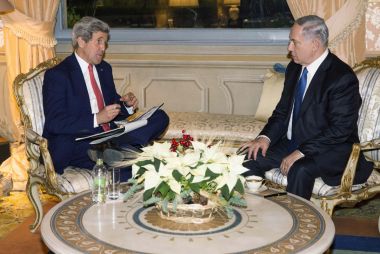Israel prime minister seeks US veto on statehood for Palestine

Israeli Prime Minister Benjamin Netanyahu on Monday sought assurances from US Secretary of State John Kerry that Washington would block efforts by Palestinians and Europeans on Palestinian statehood. "Our expectation is that the United States will stand by its position for the past 47 years that a solution to the conflict will be achieved through negotiations, and I do not see a reason for this policy to change," Netanyahu told reporters after a meeting in Rome that lasted some three hours.
Before the meeting, Israel put the United States on notice that it expected Washington to exercise its UN Security Council veto against any resolutions setting a time frame.
Netanyahu declined to comment on whether he was given an assurance by Kerry that the United States would exercise its veto. A source with knowledge of the talks who spoke on condition of anonymity said the Israeli leader had indeed asked for such an assurance.
A senior State Department official said Washington had made clear in discussions that it would oppose certain moves.
"We've made clear throughout these discussions with all of our interlocutors that there are certain things we could never support. (I'm) not going to outline those publicly," the official said.
Jordan has circulated a Palestinian-drafted resolution to the 15-member council calling for Israeli occupation of Palestinian land to end by November 2016.
US officials have indicated that Washington did not find the Palestinian draft acceptable but said that with matters still fluid, it was premature to take a position now on any particular Security Council resolution.
"Whether we have the nine votes at the Security Council or we don't, the decision has been taken to present the Palestinian-Arab resolution in the Security Council on Wednesday," said Wasel Abu Youssef, an official of the Palestine Liberation Organization, the Palestinians' highest decision-making body, led by President Mahmoud Abbas.
Palestinian UN Ambassador Riyad Mansour said that "on Wednesday, most likely a draft will be put in blue". This means the draft resolution could be put to a vote as soon as 24 hours later, though it does not guarantee it will be put to a vote.
Jordanian UN Ambassador Dina Kawar said she had not received any requests regarding action on the Palestinian draft.
When asked if she was expecting any developments at the Security Council this week, Kawar told reporters: "No, no, because Mr Kerry is having meetings in Europe with a number of ministers, so we're waiting to see what happens."
From Rome, Kerry traveled to Paris to meet with counterparts from Britain, Germany and France to discuss their efforts to draft a separate U.N. resolution to end the Israeli-Palestinian conflict.
US officials said there was no consensus among the European powers on the best way to proceed.
PALESTINIANS NEXT FOR KERRY
On Tuesday, Kerry will meet with Palestinian chief negotiator Saeb Erekat and a delegation from the Arab League in London.
A number of European parliaments, including those of Britain and France, have voted overwhelmingly in support of Palestinian statehood in non-binding resolutions.
Shortly before leaving for Rome, Netanyahu, who is in the middle of a re-election campaign, told reporters: "We will not accept attempts to dictate unilateral, time-bound moves to us. I will say these things in the clearest manner. Even if there are dictates, we will stand up to them firmly."
Strategic Affairs Minister Yuval Steinitz said Israel expected Washington to use its Security Council veto, if necessary, as it has done in the past in support of its ally.
France is also leading a bid among Europeans to draft a resolution with a less definitive timetable before Israel's March 17 election. A Western diplomat said the Europeans felt the United States was now open to that possibility.
Israeli-Palestinian peace talks championed by Kerry collapsed in April. A Gaza war last summer, heightened violence in recent weeks in Israel and the West Bank, and the Israeli election campaign have all dampened prospects that talks will resume soon.
UN Middle East peace process envoy Robert Serry briefed the Security Council on Monday and said any resolution outlining the parameters of an Israeli-Palestinian final status agreement would be important, but "not a substitute for a genuine peace process that will need to be negotiated between both parties".











